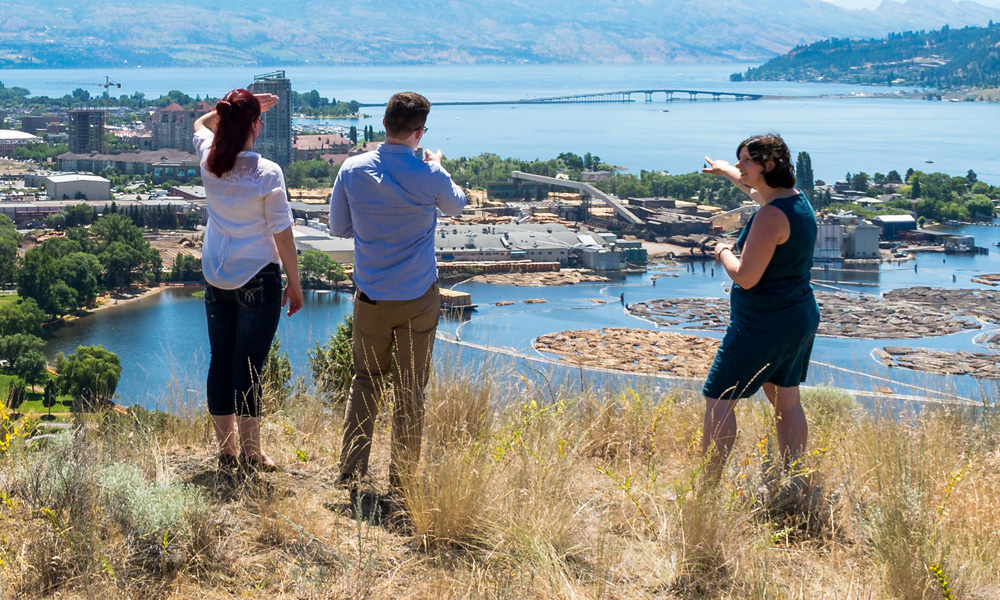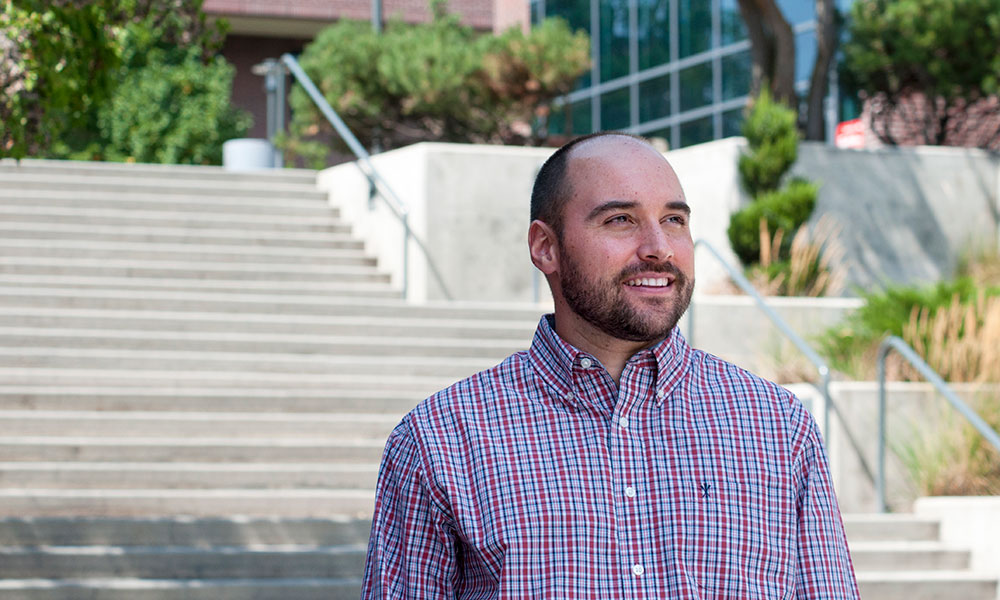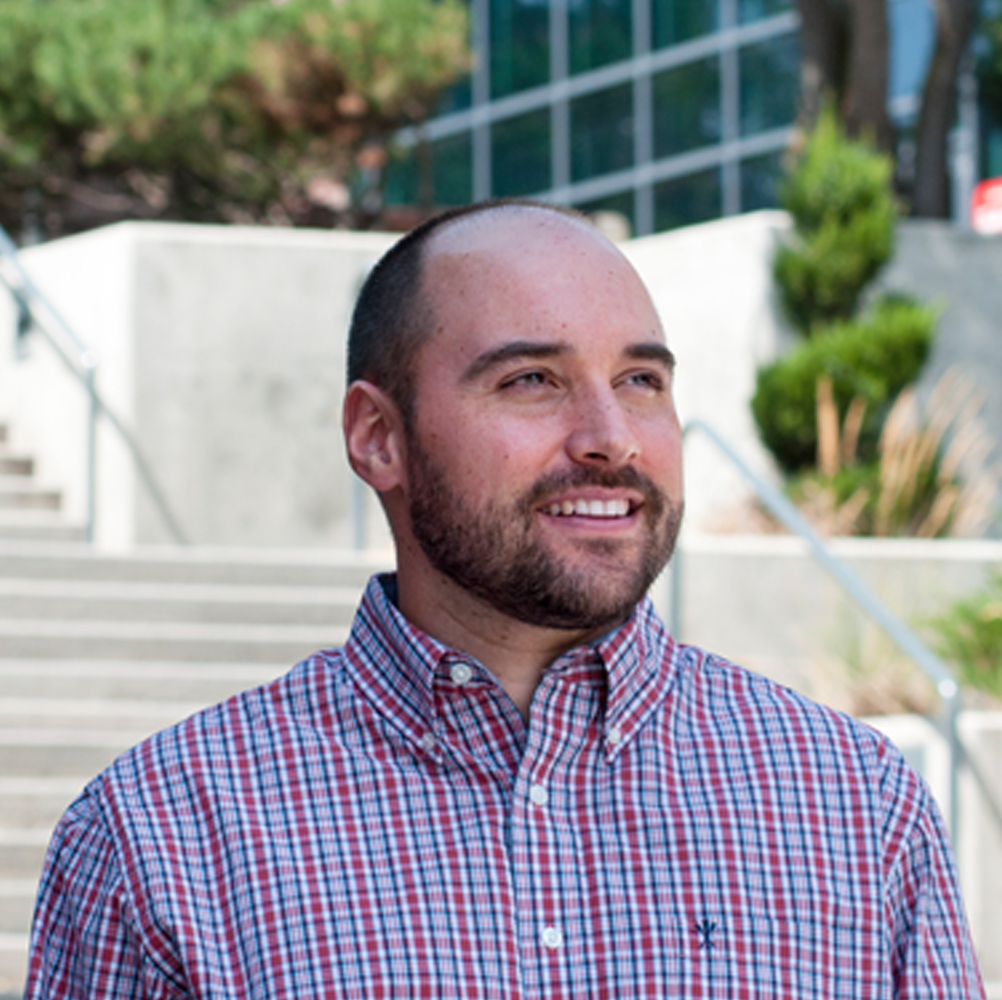Master of Arts (MA), Master of Science (MSc), Doctor of Philosophy (PhD)

Irving K. Barber Faculty of Arts and Social Sciences
| Program | Components | Length |
|---|---|---|
| Master of Arts (MA) | Coursework and thesis | 24 months |
| Master of Science (MSc) | Coursework and thesis | 24 months |
| Doctor of Philosophy (PhD) | Coursework and dissertation | 48 months |
Why study Urban and Regional Studies at UBC Okanagan?
Urban and Regional Studies (URS) provides an interdisciplinary learning setting where students can gain insights into some of the major challenges facing urban areas, as well as their linkages with wider regions and rural spaces.
Students can gain a better understanding of issues such as the politics of place, economic development, income inequality, housing, and public health.
Research in URS attempts to develop connections between urban and regional theory and analysis on the one hand, and development of urban and regional politics and practices on the other. In pursuing this diverse field of study, URS students will have the opportunity to benefit from the knowledge, resources, and collaboration of supervisors from four faculties and eight departments.
The MA and MSc interdisciplinary degrees in urban and regional studies gives graduate students access to the expertise of diverse, nationally and internationally recognized researchers from a variety of faculties and disciplines in a coherent, thematic framework.
Graduates of the program will come away with a nuanced understanding of topics relating to urbanization and regional development, and the ability to apply interdisciplinary methods and perspectives to research in this field.
Program milestones
- Establishing a faculty supervisory committee
- Completing coursework
- Preparing, presenting, and defending a thesis research proposal
- Completing thesis research and writing, and defending the work
Coursework requirements
18 credits are required for the MA degree, and 12 credits for the MSc degree, including:
- Proseminar in Interdisciplinary Studies (IGS 524)
- Theme Seminar in Urban, Rural, and Regional Dynamics (IGS 583)
- A research methods course
- Additional coursework, selected in consultation with the student’s supervisor
The student’s academic and professional history will determine if the student undertakes a Master of Arts or Master of Science degree.
The PhD degree is centred on conducting original, cutting-edge research in the field of urban and regional studies. Graduates of the PhD program are prepared for careers requiring advanced independent research and teaching in academia, government, and industry.
Program milestones
- Establishing a faculty supervisory committee
- Selecting and completing coursework
- Preparing, presenting, and defending a thesis research proposal
- Passing an oral candidacy exam
- Completing thesis research and writing
- Defending the work
Coursework requirements
The amount of coursework will vary according to the disciplines in which the student engages; however, it is expected that at least nine credits of coursework will be required, as approved by the student’s supervisory committee.
Research and Supervisors
Research Areas
Graduate students can pursue these and other faculty research and teaching interests:
- Agriculture and food security
- Economic development
- Ethnic entrepreneurship
- Gentrification and renoviction
- Governance and leadership
- Homelessness
- Housing policy
- Identity politics of/in place
- Income inequality
- Local market development and consumption
- Migration and immigration
- Public policy
- Resource management
- Rural health promotion
- Rural community development
- Social inequality
- Socialist cities
- Sustainable development
- Sustainable infrastructure
- Urban and regional governance
- Urban and regional history
- Urban economics
- Urban planning
- Urban politics
Supervisors
Please touch base with a faculty supervisor before you start the application process. We look forward to hearing about your research interests and career goals.
Luis LM Aguiar | Sociology | luis.aguiar@ubc.ca |
Research interests: The globalization of the “Justice for Janitors” campaigns; global unions; Eddie Melo: What were you? The Neoliberal University; whiteness; the Canadian Hinterland.
Lawrence Berg | Geography| lawrence.berg@ubc.ca |
Research interests: Critical studies of neoliberalism; geographies of academic knowledge production; place and the politics of identity; postcoloniality; white supremacy.
Lynn Bosetti | Education | lynn.bosetti@ubc.ca |
Research interests: Leadership in Higher Education, Critical Policy Studies, Change Management, Emotional Labour and School Choice
Judy Gillespie | Social Work | judy.gillespie@ubc.ca |
Research interests: The role of communities and their social, physical, and political infrastructures in the promotion of child welfare; the role of place in well-being, the interactions of person and place, including the ways in which professional practice is shaped by place.
John Graham | Social Work | john.graham@ubc.ca
Research Interests: homelessness reduction; international development (with a particular focus on Bedouin-Arab communities in the Middle East); social policy; diversity and social work; spirituality and social work; multicultural social work; employee well being/ subjective well being (happiness) in and out of the workplace.
Ross Hickey | Economics | ross.hickey@ubc.ca |
Research interests: Public finance and political economy; fiscal policy (government expenditure and taxation) and how it is influenced by interactions within a hierarchy of governments (municipal, provincial and federal); elections; lobbying activity.
John Janmaat | Economics | john.janmaat@ubc.ca |
Research interests: Understanding the drivers of human choices that impact on and are impacted by natural systems, and identifying interventions that can move us individually and collectively to a more sustainable relationship with the non-human world. This includes the use of models that integrate biophysical and/or social processes with economic models of behaviour and analyzing data collected through surveys and related approaches.
Eric Li | Management | eric.li@ubc.ca |
Research interests: Global consumer culture; multicultural marketing and consumption; consumer well-being; online consumer privacy; visual consumption; food consumption; fashion and culture; digital marketing and consumption.
Gordon Lovegrove | Engineering | gord.lovegrove@ubc.ca |
Research interests: SMARTer growth; sustainable community planning and design; sustainable transport and safety; hydrail powered, zero-emission regional passenger and freight rail; affordable housing and co-housing.
Bernard Momer | Geography | bernard.momer@ubc.ca |
Research interests: Urban cultural geography; urban planning; sustainability of cities; morphogenesis; geography of wine; the role of local culture in urban planning and sustainability in mid-size cities; changing landscapes of wine producing regions in Canada.
Onyx Sloan Morgan | Geography | onyx.sloanmorgan@ubc.ca |
Research interests: Critical human geography; resource extraction; sexuality and gender; political ecology; settler colonialism; youth-led research and social movements; modern treaties.
Kathy Rush | Nursing | kathy.rush@ubc.ca |
Research interests: Health and well-being of older adults with complex health challenges, across healthcare and geographic contexts; health services and transitions in care for older adults with cardiac conditions; perspectives of risk; designing innovative approaches in bringing services close to home for older adults and supporting their self-management.
Carlos Teixeira | Geography | carlos.teixeira@ubc.ca |
Research interests: Urban and social geography with emphasis on migration processes; community formation, housing and neighbourhood change; ethnic entrepreneurship and the social structure of Canadian cities; gentrification; racialization in the city; class segregation; urban form.
Helen Yanacopulos | Political Science | helen.yanacopulos@ubc.ca |
Research interests: International Development; collective action and strategy of transnational networks; civil society and NGOs; political communication; international norms; anti-slavery; conflict and development.
Andrea Craig | Economics | andrea.craig@ubc.ca |
Research interests: Using equilibrium models, I analyze households’ residential location and commute mode decisions and simulate the outcomes of proposed policy changes.
Donna Senese | Geography | donna.senese@ubc.ca |
Research interests: geographies of sustainability, rural resilience, landscapes of tourism, wine and food; mixed, participatory, and visual methodologies; conceptions of rurality, mobility, and vulnerability; regional analysis of tourism, wine and food.
Jonathan Cinnamon | Geography | jonathan.cinnamon@ubc.ca |
Research interests: digital geographies; data studies; GIS and society; science and technology studies; urban studies; surveillance; digital/visual methods; alternative urbanisms.
Facilities and Labs
Our facilities include:
Students and Alumni
Meet our students
The Urban and Regional Studies theme currently includes students at the M.A., M.Sc. and Ph.D. levels. View our list of students and alumni profiles for you to discover more about them and their research.
Connect with your peers
The Faculty of Arts and Social Sciences (FASS) cares about the experiential learning and well-being of our students, and about fostering their academic and research excellence. Follow our Faculty Facebook and Instagram to keep up to date on events and connect with our community on campus and beyond.
Theses and Dissertations
Find all UBC Okanagan student publications on the University’s digital repository for research and teaching materials.
EXPLORE STUDENT PUBLICATIONS
Careers and Outcomes
The interdisciplinary nature of the program will prepare students to continue their academic research in a wide range of fields, or for careers in diverse industries.
- Academic researcher
- Business development officer
- Educator
- Environmental educator
- Policy advocate
- Policy consultant
- Policy makers
- Planner
- Local and regional development officer
- Resource management advisor
- Sustainability officers
Tuition and Funding
Tuition
For official tuition and fee information, see the academic calendar’s page on standard masters degrees and standard doctoral degree programs.
Funding Opportunities
Graduate student stipends are funded through a combination of internal and external funding awards, Teaching Assistantships, and Research Assistantships.
Although funding and stipend amounts are not guaranteed, UBC’s Okanagan campus has a number of assistantships available for qualified students. Talk to your potential supervisor about funding opportunities.
Students are expected whenever possible to apply for relevant scholarships and fellowships.
GRADUATE ENTRANCE AWARD
The Irving K. Barber Faculty of Arts & Social Sciences offers a $15,000 merit-based entrance scholarship to three exceptional individuals entering their first year of thesis-based graduate studies under a supervisor from the Irving K. Barber Faculty of Arts & Social Sciences, or an Interdisciplinary Graduate Studies program with a supervisor who is a member of the Irving K. Barber Faculty of Arts & Social Sciences.
All applicants to Irving K. Barber Faculty of Arts & Social Sciences graduate programs who have submitted an application by January 31 will be automatically considered for the award. No additional application is required. Successful applicants will be notified by March 15.
Assistantships
Teaching Assistantships (TA)
Paid TA positions allow graduate students to develop skills in teaching, supervision, facilitation, and student assessment. Teaching assistants may lead seminars, help teach undergraduate courses, or assist in student evaluations and marking. Teaching assistants are mentored by their supervisor and via the Centre for Teaching and Learning.
Research Assistantships (RA)
As paid research assistants, graduate students assist their supervisor or other researchers in conducting high-level research, which often contributes to the student’s thesis. RAs are typically funded by the supervisor’s external grants, contracts, and sometimes, other sources of funding.
SCHOLARSHIPS
UBC Awards
The College of Graduate Studies administers merit-based graduate awards at the Okanagan campus. The College manages a number of award competitions each year and administers payment of all internal awards and selected external awards.
External Awards
All prospective graduate students (Domestic and International) should explore and apply for external awards and fellowships, including awards offered by Canada’s three research councils: CIHR, NSERC and SSHRC.
Graduate scholarships and awards may also be available from foundations, private companies or foreign governments (check with your country’s education authority).
Global and Close-Knit
At UBC Okanagan, you gain all the benefits of attending a globally ranked, top 3% university while studying in a close-knit learning community.

Discover the Okanagan
A diverse natural region with sandy beaches, beautiful lakes, vineyards, orchards and snow-capped mountains, the Okanagan is an inspirational landscape perfect for those seeking leisure or outdoor adventure.
UBC's Okanagan campus borders the dynamic city of Kelowna, a hub of economic development with a population of more than 150,000 people— the fourth fastest-growing population in Canada.

